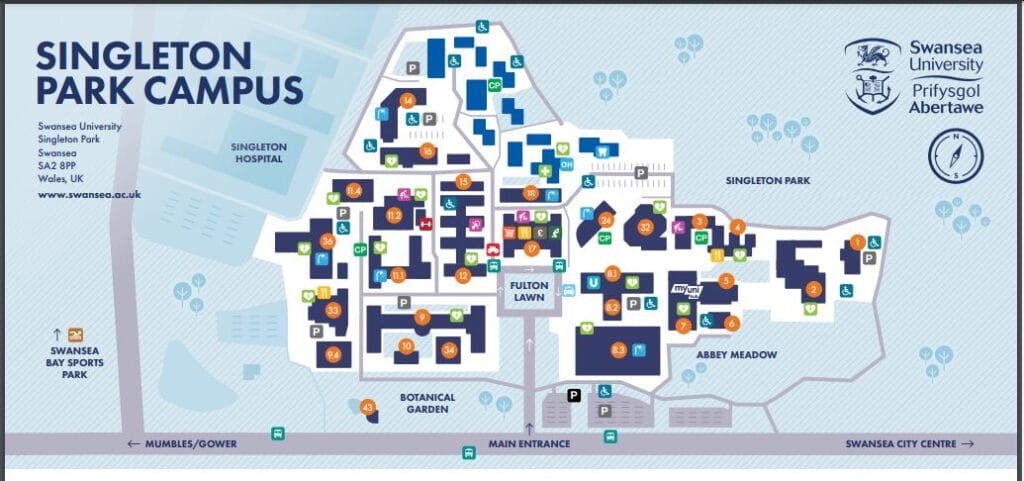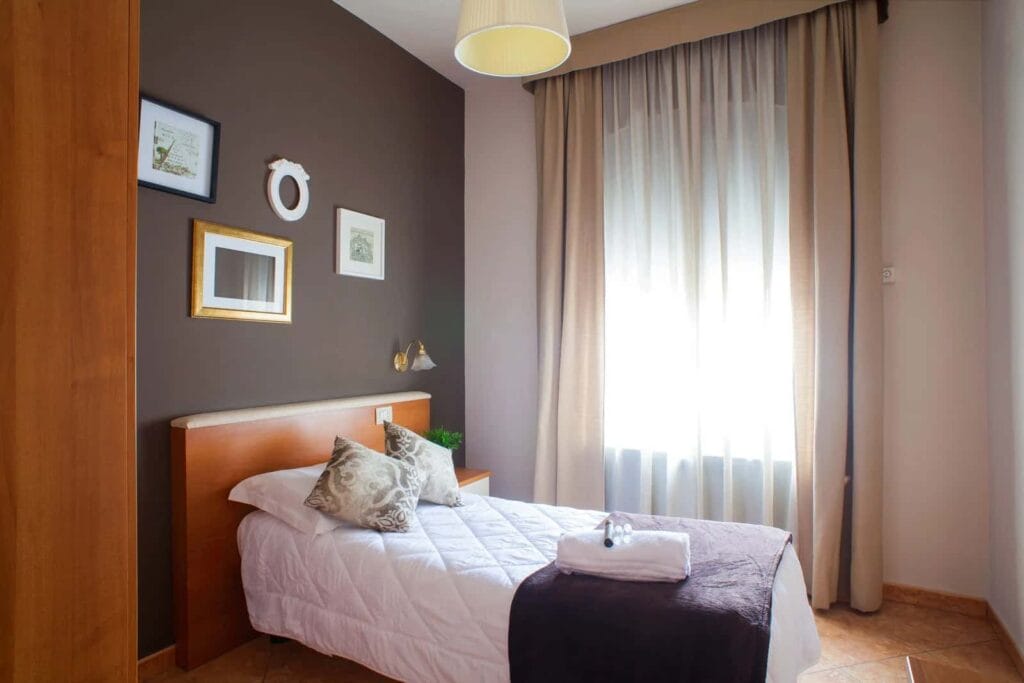
If you’re going to university in September, you’ll probably have lots of expectations about what life is going to be like. While most people’s first years are completely different, there are several things that most people experience at least once in their time as a student. Some things will probably turn out as expected, however, student life is definitely a world away from life at home.
University life on campus
Typically, a university campus can often be described as a town in and of itself, which you can see in the Swansea University campus map below. This is because there is just so much to do! Of course, Swansea is not the only university in the UK, seeing as there are over a hundred universities in the UK according to Wikipedia. But many of the features of Swansea and university also apply to other universities:

As can be seen from first glance, the university has a lot to offer when it comes to study spaces, activities, and accommodation. Within these areas, you’ll often find cafes and places to get a coffee – much needed during university life. For example, Fulton house has a café and shops such as Cost Cutters and Cwtch that can be seen from first entering the building, whilst others can be directly seen and accessed from going upstairs.
Besides the various campus shops and cafés, there are also numerous places to study, as well as computer rooms and a library filled with three floors worth of resources ready for any sort of research students may have to conduct. This means that there is a high chance of no loose ends for writing or ideas! With all that said, lets move on to another big aspect of this map: accommodation.
Accommodation

One of the most important aspects of campus life students consider when going to university is accommodation, and with good reason. After all who wouldn’t be thinking about where to live during term time? Student accommodation is a great option if someone is looking to make friends and live independently with the safety blanket of being able to go home in the summer for the most part. It is also a good choice for travel, as travel is at a minimum when anyone lives close to campus and most things after just a short walk away.
Though, of course, there are also downsides to living independently. There are a lot of costs to cover such as rent and food, and according to some students the living conditions in lower priced accommodations can be a little cramped. In my experience, though, living at home has always been the right choice as the distance to lectures is only a bus ride away and there is the pleasantness of coming home to the place i’m most comfortable with. With lectures in mind, lets take a look at what a typical lecture would entail.
Living in student accommodation will be sure to give you the ultimate university experience. Whether you live with two people or ten, spending your first year in halls will push you into meeting new people and making new friends. Living and spending every day with essentially a group of strangers can seem daunting at first, but you’ll quickly forget what it’s like to not live with them.
However, staying in student accommodation is definitely not always plane sailing. Make sure to bring your noise cancelling headphones or a good set of ear plugs because halls are noisy, whichever one you pick. People will not stop talking in the courtyard or walking past your room shouting after a night out just because you have to wake up early in the morning. Also, be prepared for the mess. Student flats will generally not be as cleanly as your childhood home and your flatmates won’t always clean up after themselves.
Freshers week & nights out

Freshers week – the highlight of the university year. If you’re a party animal already, fresher’s week will be your time to shine. Despite the week being unarguably exhausting, it provides a perfect opportunity to make friends and get to know the people you’re going to be living with for the next year. Obviously, fresher’s week is also a great time to let yourself go away from mum and dad and enjoy the first of the many nights out uni has to offer. However, don’t expect all future nights out to be like those in fresher’s week. Eventually, the several bottles of expensive spirit you brought with you in September will run out and you’ll spend every other night in the club with the cheapest entry after downing whatever alcohol Aldi has to offer under £5.
One of the most important things to remember about fresher’s week is to not get sucked into spending lots of money on tickets for events. Be sure to buy a wristband from your student union, however, don’t buy any tickets for any big Facebook events that may come up. These are often fake, and you probably won’t end up going to everything you buy a ticket for.
Many people think that going to uni means going out 7 nights a week. Although some super human students make this happen, the reality is staying in most nights because you either can’t afford to go out or can’t be bothered to.
Food shopping & cooking
The weekly trip to Aldi, Lidl, Tesco or wherever you can get the cheapest food in your area will usually turn out to be the worst half an hour of your week. Not only do you end up spending copious amounts of money you don’t have on food you won’t end up eating, the trip carrying your shopping back to your student accommodation will seriously test your fitness levels. If you’re lucky enough to know someone with a car, you’ve hit the jackpot – make sure to become their best friend so that you don’t have to suffer the pain of the weekly walk to the shops.
The myth of the student diet is not always entirely correct. Although it is too easy to live on McDonalds and Deliveroo every day of the week, alternatively, uni is a good time to learn how to cook properly and impress your parents with your skills when you go home. So, make sure you get your student cookbook ready and resist the urge of the takeaway as your uni years may bring out your inner chef. Or, if this doesn’t sound like you, a lot of students do rely on trusty pasta and various pre-made sauces.
Juggling a part-time job

The reality of being a student is being poor. Unless you have a rather hefty student loan or have worked hard on a gap year, having a part-time job is essential if you don’t want to fall into the deep black hole of the overdraft. Even if you want to ‘concentrate on your studies’ in your first year (aka want to go out and not worry about having to go to work the next day), you’ll need to earn some money eventually.
The university and the student union are often good places to start for part-time work. Jobs there will usually be close to your accommodation and will pay well, so what’s not to like? Yet, these positions in and around uni will be snapped up fast so it’s probably a good idea to look at retail and bar work also.
Lectures

As far as personal experience and the experience of others go, lectures tend to be between 1 and 2 hours long depending on the subject. These lectures are taken on by between 1 and 3 lecturers who normally split the lectures, but this doesn’t make a difference to the students except maybe slight differences in teaching methods. Even though some students fail to attend at least half of their lectures, it’s strongly advised to avoid this attitude as much as possible.
For one, students may miss valuable information that the powerpoint on the relevant intranet doesn’t cover and which may be included in the exam, spelling bad news for those hoping to get the top grades offered. More than that, though, both lectures and other related classes are often quite fun and an interesting learning experience so there is plenty of reason to attend them. And besides, if someone liked a subject enough to take it at university then an effort may as well be made to indulge in all parts of it, lectures included. But enough of university in general; what is a typical day at university like?
No matter what you go to university thinking, attending all your lectures is actually a lot harder than going to school every day. Unbelievably, waking up for a 10am lecture or seminar is pretty much impossible once the motivation of the first few weeks wears off, especially if you go out the night before. By the end of the first semester, it almost becomes a competition to see who has the worst percentage of attendance. However, don’t believe it when people say that you can easily pass your course without attending lectures at all – you’ll regret all the lie-ins and lazy days in June.
It’s likely that every future university student will hear the phrase “first year doesn’t count” before starting. Although for the majority of courses this is true, first year shouldn’t always be considered as a year of relaxing and doing no work; the workload is definitely small compared to other years, however, you might find you’ll fall behind if you don’t take it seriously.
Typical day at university

For one, university life isn’t as jam packed as one might think at first. The day often starts with either a bus trip or walk to campus. There might even be time before lessons start if your lucky, in which case a morning coffee is usually a must especially if it’s an early class. The day normally has no more than two lectures of one or two hours each depending on the course, leaving the rest of the day free! Of course, that is sometimes an exaggeration considering that most if not all of the work is to be carried out outside of lecture, but that doesn’t mean there isn’t free time either.
Over the course of the year and from other opinions, it is safe to say that the most free time comes at around the beginning of term before deadlines begin to pile up. Feel free to explore the libraries, shops, and nightlife in these pockets of free time or even just stay home as some people might. But remember, come the end of term be sure to get a library space earlier rather than later if there is work that needs doing.
Authors
-
Aminah is a dedicated content expert and writer at Unifresher, bringing a unique blend of creativity and precision to her work. Her passion for crafting engaging content is complemented by a love for travelling, cooking, and exploring languages. With years spent living in cultural hubs like Barcelona, Sicily, and Rome, Aminah has gained a wealth of experiences that enrich her perspective. Now based back in her hometown of Manchester, she continues to immerse herself in the city's vibrant atmosphere. An enthusiastic Manchester United supporter, Aminah also enjoys delving into psychology and true crime in her spare time.
View all posts





